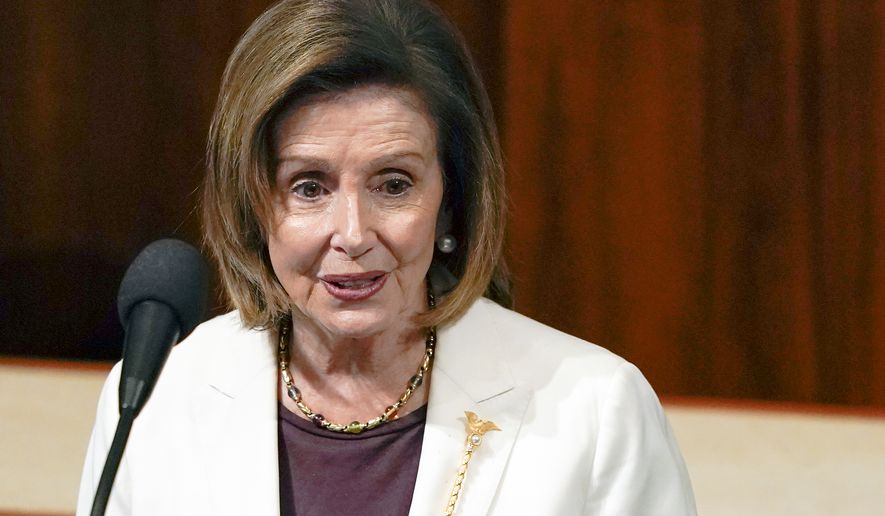It’s the end of an era for Democrats — and the nation.
House Speaker Nancy Pelosi told fellow lawmakers Thursday that she will step aside from the top Democratic leadership role she has held for nearly two decades.
She delivered the announcement to a packed chamber a day after Republicans officially clinched the House majority, albeit a small one, that will give them control of the gavel that they lost four years ago.
Her exit also follows the attack on her husband, Paul, by a hammer-wielding intruder in their San Francisco home last month. The assault left Mr. Pelosi with a fractured skull and other injuries from which he is still recovering.
“For me, the hour has come for a new generation to lead the Democratic Caucus that I so deeply respect, and I’m grateful that so many are ready and willing to shoulder this awesome responsibility,” Mrs. Pelosi told lawmakers.
Mrs. Pelosi, 82, isn’t retiring from Congress. She plans to play an advisory role for the leadership team, which is about to undergo its biggest shuffle in more than 15 years. She will continue to represent her congressional district in San Francisco, a seat she has held since 1987.
President Biden called Mrs. Pelosi “the most consequential speaker of the House of Representatives in our history.” The president said she was “a singular force” in helping to pass his agenda, including a $1.9 trillion COVID-19 relief plan in 2021 as well as a $1 trillion infrastructure package, the $740 billion Inflation Reduction Act and other legislation.
Republicans have blamed the big spending in the past two years for inflation that reached a 41-year high last summer.
Mrs. Pelosi made the decision as House Democrats clamored for fresh faces in leadership and a chance for some of them to climb the power ladder in Washington.
Her likely successor is Rep. Hakeem Jeffries, 52, of New York, who now serves as caucus chairman, the House Democrats’ messaging chief.
If elected by the caucus, Mr. Jeffries will serve as minority leader.
Mrs. Pelosi’s announcement was swiftly followed by news from her longtime deputy, 83-year-old Majority Leader Steny H. Hoyer, that he, too, will step aside from his top post but will remain in Congress representing Maryland’s 5th Congressional District.
“Now is the time for a new generation of leaders,” Mr. Hoyer wrote to Democratic lawmakers.
Mr. Hoyer endorsed Mr. Jeffries in his letter to Democrats.
Mrs. Pelosi’s speech was met with standing ovations and continuous applause from Democrats as she gave a brief history of her 35 years in the House and the major accomplishments under her leadership — the biggest among them the passage of the Affordable Care Act, otherwise known as Obamacare.
Both parties were marking the announcement for vastly different reasons. Republicans this week celebrated voters having “fired” Mrs. Pelosi in midterm elections that gave their party a narrow majority. The development ousted from Democrats’ leadership the lawmaker most associated by the right with a big-spending, far-left agenda in Washington.
Still, even Republicans admired her longevity and toughness.
“She certainly deserves respect for the type of leader she’s been,” said Rep. Austin Scott, Georgia Republican. “She’s a tough competitor, and she will be a power player in Democratic politics for as long as she decides to be.”
Democrats have credited Mrs. Pelosi, the first female speaker, with largely holding the party together for tough votes while often dealing with a small majority. They also praised her for repeatedly standing up to President Trump in a series of historic clashes.
House Democrats will hold leadership elections in the coming weeks, without Mrs. Pelosi in the running for the first time since 2002.
She told lawmakers that only a dozen Democratic women served when she arrived in the House. Today, there are 90.
“And we want more,” she said.
It’s not clear whether any women will be part of the new leadership team.
There’s no indication yet as to whether Majority Whip James E. Clyburn, 82, will also depart from leadership, but Mrs. Pelosi’s exit is likely to invite challenges to the entire leadership team.
Mrs. Pelosi’s decision launches the beginning of a new era for House Democrats, the majority of whom have known no other leader.
She has been in House Democratic leadership since her historic rise to minority whip in 2002, when she broke into an elite club that had long excluded women.
A year later, in 2003, she ascended to minority leader, the party’s top leadership post in the House, defeating Mr. Hoyer.
Within three years, she steered House Democrats to a historic election win that gave them the majority for the first time in 12 years and made her the first woman to hold the speaker’s gavel.
She has set another record by serving as the nation’s oldest House speaker and tied a third one as the only person aside from Texas Democrat Sam Rayburn to serve two nonconsecutive terms as House speaker.
Mrs. Pelosi’s decision to stay in office is not unprecedented. Rep. J. Dennis Hastert, Illinois Republican, stepped down from leadership after he lost the speaker’s gavel in the 2006 election. He remained in office until 2007.
By exiting the leadership this year, Mrs. Pelosi won’t have to hand over the gavel to her likely successor, Rep. Kevin McCarthy, a California Republican who is poised to become speaker.
That job will fall to Mr. Jeffries. If he wins the role of minority leader, Mr. Jeffries will already be eyeing the party’s path back to the majority and taking over the gavel as the nation’s first Black speaker.
• Susan Ferrechio can be reached at sferrechio@washingtontimes.com.
• Mica Soellner can be reached at msoellner@washingtontimes.com.




Please read our comment policy before commenting.